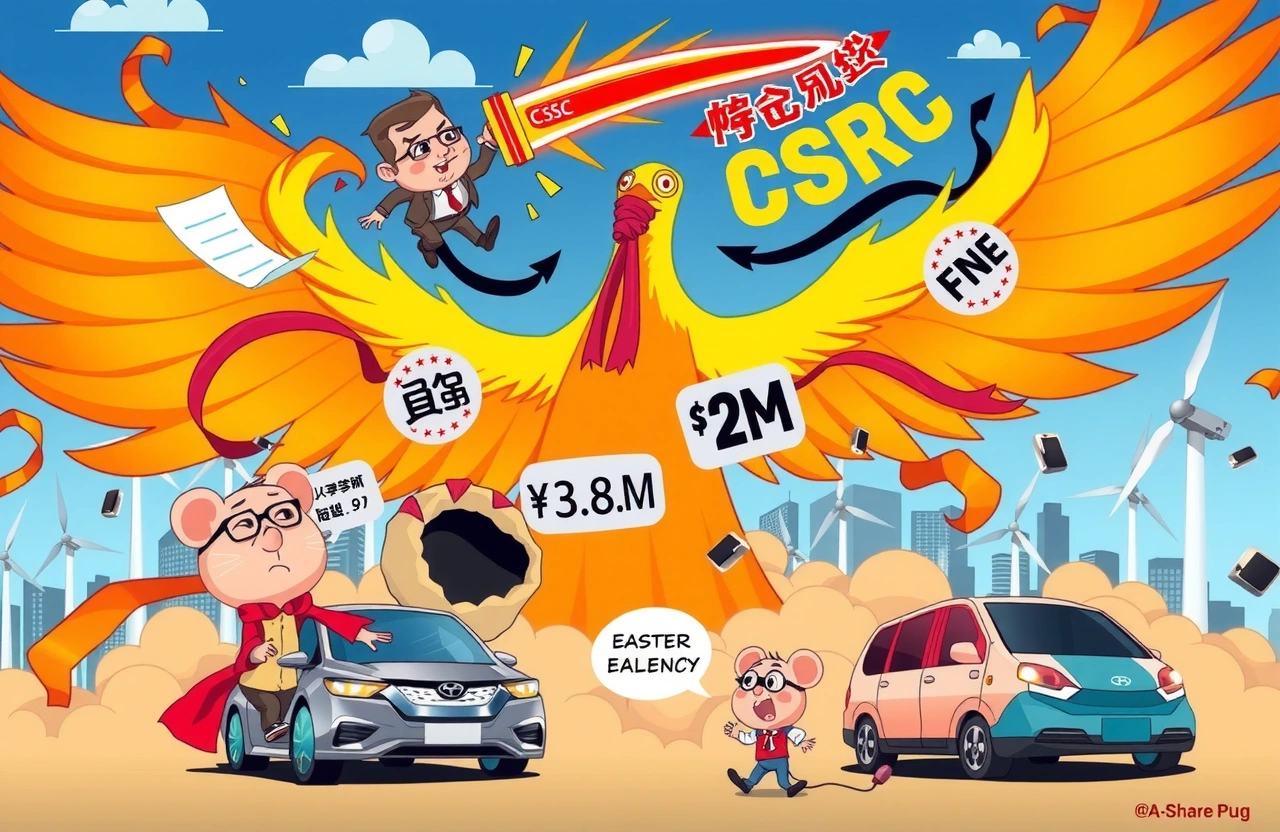The Watershed Moment in Financial Regulation
China’s securities market witnesses a historic shift as regulators deliver their first-ever penalties against third-party facilitators of corporate fraud. The China Securities Regulatory Commission (CSRC) has imposed sanctions on Yu and He (于某、贺某), who provided shell companies to assist Yuebo Power’s (越博动力) financial deception. This landmark enforcement of full-chain accountability shatters the traditional ‘escape routes’ for fraud enablers, signaling a tectonic shift in market governance. By extending liability beyond corporate insiders to external collaborators, regulators demonstrate unprecedented resolve to cleanse China’s capital markets.
Yuebo Power, a former star in new energy vehicle components, systematically fabricated sales records and asset transactions from 2018 to 2022. Their elaborate scheme involved phantom transactions with companies controlled by Yu and He, creating an illusion of profitability that misled investors. The company’s delisting in 2023 foreshadowed this decisive regulatory action, which now sets a binding precedent for all market participants.
Anatomy of the Fraud Scheme
Yuebo Power executed a sophisticated two-pronged deception strategy that exploited regulatory blind spots:
The Fictitious Transaction Network
From 2018 through 2022, the company manufactured non-existent sales of new energy vehicle powertrains. By routing these phantom transactions through entities controlled by Yu and He, they created:
- Fictitious revenue streams exceeding legitimate operations
- Fabricated supply chain documentation
- Cross-invoicing schemes between complicit parties
This complex web involved multiple shell companies that appeared as legitimate business partners, making detection exceptionally challenging for auditors and regulators.
The Asset Manipulation Playbook
Parallel to fake sales, Yuebo artificially inflated balance sheets through:
- Sham asset transfers to collaborator entities
- Overvaluation of intellectual property and equipment
- Circular transactions that recycled capital through partner networks
The dual approach created a self-reinforcing illusion of growth and stability that persisted for four consecutive years.
The Full-Chain Accountability Framework
CSRC’s groundbreaking enforcement action establishes a new paradigm in market oversight, fundamentally altering how financial crimes are prosecuted.
Closing the Third-Party Loophole
For the first time in A-share history, regulators applied Article 197 of China’s Securities Law to classify third-party collaborators as ‘joint violators’. This legalation allows punishment of:
- Shell company providers like Yu (fined ¥2 million)
- Transaction facilitators like He (fined ¥300,000)
- Document forgery specialists
- Financial intermediaries enabling sham deals
Previously, such actors exploited jurisdictional gaps to avoid consequences despite being integral to fraud ecosystems.
The Enforcement Mechanism
CSRC deployed a multi-tiered penalty structure creating severe disincentives:
- Corporate fines totaling ¥30.8 million against Yuebo Power
- 8-10 year market bans for key executives
- Personal liability for controlling shareholders
- Criminal referrals for egregious violations
This approach ensures all participants in the fraud chain face meaningful consequences proportional to their involvement.
Market-Wide Implications
The full-chain accountability doctrine fundamentally reshapes incentives and behaviors across China’s financial ecosystem.
Investor Protection Advancements
By dismantling fraud networks, the reforms directly benefit market participants through:
- Reduced information asymmetry in investment decisions
- Enhanced credibility of financial disclosures
- Stronger safeguards against ‘bad money’ crowding out legitimate firms
Retail investors gain critical protection from sophisticated deception schemes that previously exploited regulatory gaps.
Institutional Compliance Transformation
Public companies now face unprecedented due diligence requirements regarding:
- Counterparty verification procedures
- Supply chain transparency mechanisms
- Related-party transaction documentation
Audit committees must implement enhanced verification protocols to avoid liability for third-party malfeasance.
The Regulatory Roadmap
This enforcement action forms part of a comprehensive strategy to rebuild market integrity.
Interagency Coordination Framework
The June 2024 ‘Opinions on Comprehensively Preventing and Punishing Capital Market Financial Fraud’ established:
- Joint CSRC-Ministry of Public Security investigation protocols
- Cross-departmental information sharing systems
- Standardized evidence collection procedures
This inter-ministerial cooperation model significantly enhances enforcement capabilities against complex fraud networks.
Incentive Alignment Mechanisms
Regulators implemented a ‘wide-strict’ enforcement policy offering:
- Penalty reductions for voluntary compliance improvements
- Exemption opportunities for whistleblowers
- Streamlined settlement for cooperative subjects
This balanced approach encourages self-correction while maintaining severe consequences for intentional violations.
Future Market Evolution
The full-chain accountability principle will trigger fundamental changes in how China’s capital markets operate.
Industry-Wide Compliance Upgrades
Public companies must now implement:
- Third-party risk assessment frameworks
- Blockchain-based transaction verification
- Artificial intelligence monitoring of abnormal patterns
Service providers face heightened scrutiny of client selection processes and transaction validation methods.
Systemic Risk Reduction
By dismantling fraud ecosystems, regulators achieve:
- Lower risk premiums for legitimate companies
- Reduced contagion risk from fraudulent listings
- Enhanced international investor confidence
Market stability improves as capital allocation increasingly reflects genuine economic value rather than manufactured metrics.
The Path Forward for Market Participants
This regulatory watershed demands proactive adaptation from all stakeholders. Companies must immediately audit third-party relationships and implement verification protocols that meet the new accountability standards. Investors should reevaluate holdings for supply chain transparency and documentation quality. Service providers face existential choices: become compliance partners or risk extinction. The era of looking the other way has ended – integrity now defines market survival. Review your exposure, strengthen governance, and join the movement toward transparent capital markets that serve China’s economic future.




